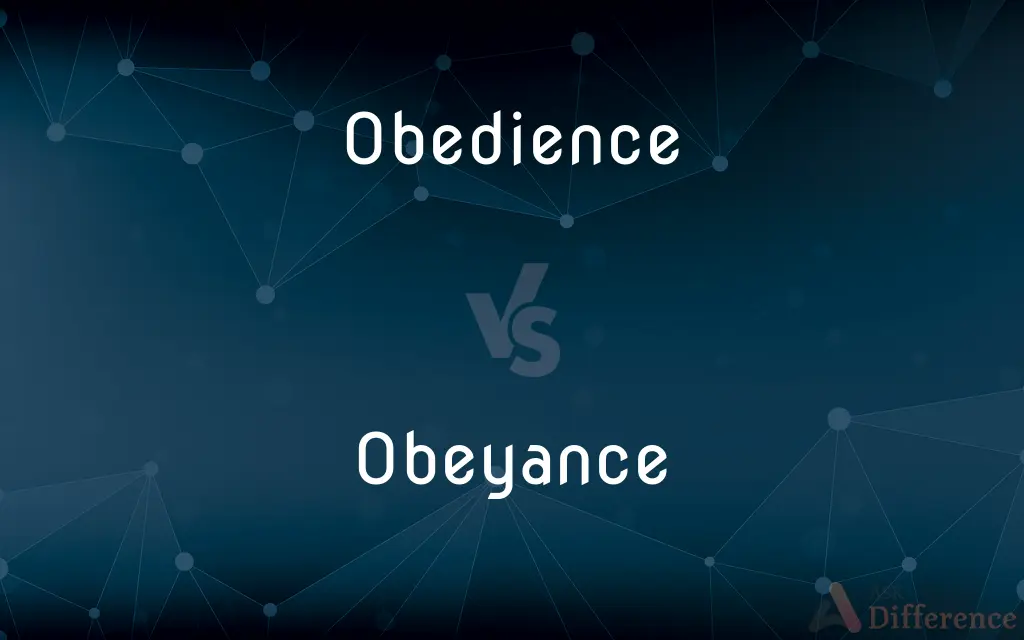Obedience vs. Obeyance — What's the Difference?
By Tayyaba Rehman & Urooj Arif — Updated on April 7, 2024
Obedience involves compliance with commands or laws, showing submission to authority. Obeyance, while less common, refers to a state of deference or waiting, often with a temporary aspect.

Difference Between Obedience and Obeyance
Table of Contents
ADVERTISEMENT
Key Differences
Obedience is the act of following directions, commands, or laws set by those in authority, such as parents, teachers, or government officials. It denotes a direct and active form of submission to authority. Whereas obeyance is a nuanced term that often refers to a state of deference or awaiting instruction, with an implication of temporary adherence or suspension.
In the context of societal norms, obedience plays a crucial role in maintaining order and discipline within various institutions, including families, schools, and legal systems. Individuals are expected to act in accordance with set guidelines. On the other hand, obeyance might be observed in situations where actions or decisions are deferred or held in abeyance, suggesting a pause or temporary compliance until further notice or changes.
Obedience is generally demanded or expected in many cultures and institutions, often seen as a virtue or a necessary behavior for societal cohesion. It is straightforward and measurable, based on specific requests or established norms. Obeyance, however, is less about active compliance and more about a state of readiness or temporary adherence, often used in legal or formal contexts to indicate a holding pattern or temporary observance.
When it comes to legal contexts, obedience is clearly defined and enforced by laws and regulations, requiring individuals to adhere to the rules of a governing body. Conversely, obeyance can be seen in legal terms as a temporary suspension of actions or rights, such as holding property in "obeyance" until legal disputes are resolved, highlighting its temporary and often conditional nature.
The concept of obedience is also prevalent in religious contexts, where followers are expected to comply with the doctrines and commands of their faith. This form of obedience is often seen as a moral obligation or a path to spiritual fulfillment. In contrast, obeyance doesn’t typically have a religious connotation but could be used metaphorically to describe a period of waiting or anticipation for divine guidance or intervention.
ADVERTISEMENT
Comparison Chart
Definition
Compliance with commands, laws, or authority.
A state of deference or suspension, awaiting instructions or changes.
Context
Found in disciplinary, familial, educational, and legal contexts.
Often used in legal, formal, or transitional situations.
Nature
Active and direct submission to authority.
Temporary adherence or deference, implying a holding pattern.
Measurement
Straightforward, based on adherence to clear commands or laws.
Conditional and temporary, depending on situational changes.
Typical Usage
Commonly used in everyday language to describe submission.
Less common, used in specific contexts like legal terms.
Compare with Definitions
Obedience
Following commands or instructions from an authority figure.
The student's obedience to the teacher's rules contributed to a harmonious classroom environment.
Obeyance
A temporary observation of norms or practices.
Traditions are sometimes kept in obeyance during transitional societal periods.
Obedience
The act of obeying or a behavior intending to obey.
The dog’s obedience was the result of months of training.
Obeyance
The condition of being temporarily compliant or deferential.
The old rules were in obeyance until the new regulations were officially published.
Obedience
Compliance with laws or regulations.
Citizens showed their obedience by adhering to the new regulations without protest.
Obeyance
The act of deferring or awaiting action.
The committee’s recommendations remained in obeyance until the board’s next meeting.
Obedience
Submission to a higher power or authority.
In many religions, obedience to divine commandments is seen as a virtue.
Obeyance
A state of suspension or waiting for future instructions.
The decision was held in obeyance pending further evidence.
Obedience
The quality or condition of being obedient.
Obeyance
Legal holding or suspension of rights or procedures.
The property was in obeyance until the dispute was resolved in court.
Obedience
The act of obeying.
Obedience
A sphere of ecclesiastical authority.
Obedience
A group of people under such authority.
Obedience
The quality of being obedient.
Obedience is essential in any army.
Obedience
The collective body of persons subject to any particular authority.
Obedience
A written instruction from the superior of an order to those under him.
Obedience
Any official position under an abbot's jurisdiction.
Obedience
The act of obeying, or the state of being obedient; compliance with that which is required by authority; subjection to rightful restraint or control.
Government must compel the obedience of individuals.
Obedience
Words or actions denoting submission to authority; dutifulness.
Obedience
A following; a body of adherents; as, the Roman Catholic obedience, or the whole body of persons who submit to the authority of the pope.
Obedience
The act of obeying; dutiful or submissive behavior with respect to another person
Obedience
The trait of being willing to obey
Obedience
Behavior intended to please your parents;
Their children were never very strong on obedience
He went to law school out of respect for his father's wishes
Common Curiosities
Can obeyance be considered a form of obedience?
While obeyance involves a form of compliance, it is specifically characterized by its temporary and often conditional nature, different from the straightforward compliance seen in obedience.
How are obedience and obeyance different?
Obedience is active compliance with commands or laws, while obeyance denotes a temporary state of waiting or suspension.
Is obedience always a positive trait?
While obedience is often valued for maintaining order, excessive obedience without question can lead to negative outcomes, such as the suppression of individual freedom.
Can a person be both obedient and in obeyance?
Yes, a person can exhibit obedience by actively following commands while also being in a state of obeyance in aspects that require temporary suspension or deference.
How does culture affect perceptions of obedience?
Cultural norms and values significantly influence how obedience is perceived, with some cultures emphasizing its importance more than others.
Is obeyance a common practice in legal disputes?
Yes, in legal disputes, certain rights or actions may be held in obeyance until a resolution is reached, indicating a temporary suspension.
Can obeyance lead to indecision or inaction?
While obeyance involves waiting or suspension, it is typically directed and purposeful, aimed at a future action or decision rather than leading to indecision.
What is obedience?
Obedience is the act of following commands, laws, or directions from an authority figure or institution.
What does obeyance mean?
Obeyance refers to a state of deference, suspension, or temporary compliance, often awaiting further instructions or developments.
How does one balance obedience with critical thinking?
Balancing obedience with critical thinking involves following authority while also questioning and evaluating the validity and ethics of commands.
In what contexts is obeyance commonly used?
Obeyance is most commonly used in legal and formal contexts, indicating a temporary state of suspension or deference.
What role does obedience play in education?
In education, obedience is crucial for maintaining discipline and facilitating learning, ensuring that students follow rules and respect authority.
What are the consequences of failing to observe obeyance?
Failing to observe obeyance, especially in legal contexts, can lead to complications, including legal penalties or the loss of rights or opportunities.
Does obeyance imply a lack of control?
Obeyance may imply a temporary relinquishment of control but is often a strategic choice awaiting further information or a better moment for action.
How is obedience enforced in different societies?
Obedience is enforced through various means, including legal penalties, social pressure, and cultural expectations, varying widely across societies.
Share Your Discovery

Previous Comparison
Present vs. Absent
Next Comparison
Swap vs. ChangeAuthor Spotlight
Written by
Tayyaba RehmanTayyaba Rehman is a distinguished writer, currently serving as a primary contributor to askdifference.com. As a researcher in semantics and etymology, Tayyaba's passion for the complexity of languages and their distinctions has found a perfect home on the platform. Tayyaba delves into the intricacies of language, distinguishing between commonly confused words and phrases, thereby providing clarity for readers worldwide.
Co-written by
Urooj ArifUrooj is a skilled content writer at Ask Difference, known for her exceptional ability to simplify complex topics into engaging and informative content. With a passion for research and a flair for clear, concise writing, she consistently delivers articles that resonate with our diverse audience.













































